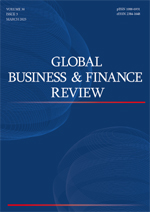학술논문
Exploring the Impac t of Digital Financial Services and Financial Inclusion on Economic Growth in Tunisia: An Empirical Analysis
이용수 0
- 영문명
- 발행기관
- People & Global Business Association
- 저자명
- Jihène Khalifa
- 간행물 정보
- 『Global Business and Finance Review』Vol.30 No.7, 16~28쪽, 전체 13쪽
- 주제분류
- 경제경영 > 경영학
- 파일형태
- 발행일자
- 2025.07.31

국문 초록
Purpose: This research seeks to examine how different factors of financial inclusion and digital financial services have influences Tunisia's GDP growth rate between 2004 and 2022. The primary indicators assessed include the number of ATMs per 100,000 adults, the number of bank borrowers per 1,000 adults, the number of commercial bank branches per 100,000 adults, and the number of internet users. The study investigates the impact of these factors on economic growth, exploring whether they contribute to or constrain growth.
Design/methodology/approach: The study employs the Auto Regressive Distributed Lag (ARDL) model to examine both long-term and short-term equilibrium relationships between digital financial service indicators, financial inclusion variables, and economic growth. This methodological approach is selected to capture dynamic interactions between variables over time.
Findings: The findings highlight a positive long-term relationship between the number of borrowers and GDP growth, while commercial bank branches exhibit a negative impact. ATMs show a positive influence in the short term, supporting economic activities by enhancing liquidity. The study underscores inefficiencies in traditional banking and the need for improved digital financial inclusion. Policymakers are advised to expand digital financial infrastructure, promote financial literacy, and address structural barriers to leverage financial inclusion for sustainable growth.
Research limitations/implications: The study's focus on Tunisia may limit the generalizability of findings to other regions. Additionally, due to data constraints, other potential digital financial service indicators could not be included, which may provide additional insights into the relationship between financial inclusion and development.
Originality/value: This study adds to the scarce literature on how digital financial services and financial inclusion influence economic growth in Tunisia. Through highlighting both the positive and negative impacts of various financial inclusion indicators, it provides key insights for policymakers seeking to utilize digital finance to drive sustainable economic growth.
영문 초록
목차
I. Introduction
II. Review of Literature
III. Methodology and Research Model
IV. Conclusion
References
해당간행물 수록 논문
참고문헌
최근 이용한 논문
교보eBook 첫 방문을 환영 합니다!

신규가입 혜택 지급이 완료 되었습니다.
바로 사용 가능한 교보e캐시 1,000원 (유효기간 7일)
지금 바로 교보eBook의 다양한 콘텐츠를 이용해 보세요!




